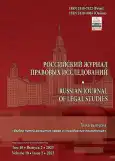Современный законодательный процесс: от правовых тенденций к прогнозируемым сценариям развития
- Авторы: Залоило М.В.1
-
Учреждения:
- Институт законодательства и сравнительного правоведения при Правительстве Российской Федерации
- Выпуск: Том 10, № 2 (2023)
- Страницы: 39-48
- Раздел: Теоретико-исторические правовые науки
- URL: https://journal-vniispk.ru/2410-7522/article/view/131832
- DOI: https://doi.org/10.17816/RJLS340850
- ID: 131832
Цитировать
Аннотация
Цели исследования заключаются в выявлении тенденций развития законодательного процесса в Российской Федерации и формулировании предложений по повышению его эффективности. Для их достижения анализу подвергаются правовое регулирование и статистика осуществления законодательного процесса в Российской Федерации, исследуются доктринальные концепции и прогнозы развития законодательного процесса, в том числе в условиях цифровизации, иных глобальных вызовов.
В основу исследования положено использование системного, структурно-функционального, формально-юридического, сравнительно-правового методов, методик правового моделирования и юридического прогнозирования в их совокупности.
Установлено, что развитие современного законодательного процесса осуществляется в направлениях: регулирования на уровне большого числа нормативных правовых актов разной юридической силы, включая законодательные, а также подзаконные акты; высокой активности одних субъектов права законодательной инициативы наряду с низкой активностью других; систематической расчистки законопроектной базы, что одновременно дополняется практикой внесения законопроектов с аналогичным или схожим предметом регулирования взамен отклоненных; необходимости и состоятельности модели непосредственного участия Президента РФ в законодательном процессе; повышения в законодательном процессе роли Правительства РФ и роста его законопроектных работ; приращения числа инициаторов федеральных законопроектов либо создания дополнительных правовых условий и гарантий реализации ими своих законотворческих идей и предложений при сохранении действующего субъектного состава права законодательной инициативы; сохранения практики краткосрочного планирования законопроектных работ наряду с нарастающей необходимостью обеспечения комплексного и перспективного их планирования; усиления взаимодействия ветвей власти в законодательном процессе, в том числе за счет деятельности Комиссии Правительства РФ по законопроектной деятельности; научного обеспечения законодательного процесса и возрастания значения таких его принципов, как профессионализм, научность; информационного сопровождения законодательного процесса; влияния на законодательный процесс уровня развития юридической техники, современных информационных технологий и процедур. Определены перспективные задачи для юридической науки, которые необходимо решить для обеспечения эффективности законодательного процесса.
Полный текст
Открыть статью на сайте журналаОб авторах
Максим Викторович Залоило
Институт законодательства и сравнительного правоведения при Правительстве Российской Федерации
Автор, ответственный за переписку.
Email: z-lo@mail.ru
ORCID iD: 0000-0003-4247-5242
SPIN-код: 5892-5522
Scopus Author ID: 57215428696
Кандидат юридических наук
Россия, МоскваСписок литературы
- Гаврилов О.А., Колдаева Н.П., Приголкин А.С., и др. Научные основы советского правотворчества / отв. ред. Р.О. Халфина. Москва: Наука, 1981. 317 с.
- Пиголкин А.С. Подготовка проектов нормативных актов. Москва: Юридическая литература, 1968. 167 с.
- Правотворчество в СССР / под ред. А.В. Мицкевича. Москва: Юридическая литература, 1974. 319 с.
- Цифровизация правотворчества: поиск новых решений: монография / под общ. ред. Д.А. Пашенцева. Москва: ИНФРА-М, 2019. 234 с.
- Золотухина Т.А. Законотворческая деятельность в Российской Федерации: теоретиков-правовое исследование: дис. … д-ра юрид. наук. Белгород, 2017. 452 с.
- Керимов Д.А. Культура и техника законотворчества. Москва: Юридическая литература, 1991. 160 с.
- Крашенинников П.В. Закон и законотворческий процесс. Москва: Статут, 2017. 160 с.
- Фомичева О.А. Законотворческий процесс в Российской Федерации: конституционно-правовое исследование: дис. … д-ра юрид. наук. Екатеринбург, 2022. 400 с.
- Парламентское право России: монография / под ред. Т.Я. Хабриевой. Москва: Издание Государственной Думы, 2013. 400 с.
- Чиркин В.Е. Законодательная власть. Москва: Норма, 2008. 336 с.
- Абрамова А.И. Законодательный процесс в Российской Федерации: проблемы и перспективы. Москва: Юристъ, 2005. 139 с.
- Минх Г.В. Законодательная инициатива Президента Российской Федерации как конституционно-правовой институт // Журнал российского права. 2016. № 1. С. 89–99. doi: 10.12737/17234
- Организация законопроектной работы в системе федеральных органов исполнительной власти / под ред. Т.Я. Хабриевой. Москва: Юристъ, 2006. 138 с.
- Шувалов И.И. Правительство Российской Федерации в законотворческом процессе: монография. Москва: Норма, 2004. 144 с.
- Закон: от проекта до реализации (зарубежный опыт): монография / отв. ред. А.Н. Пилипенко. Москва: Инфотропик Медиа, 2022. 272 с.
- О нормативных правовых актах в Российской Федерации (проект федерального закона). 6-е изд., перераб. и доп. / рук. авт. коллектива Т.Я. Хабриева, Ю.А. Тихомиров. Москва: ИЗиСП, 2021. 96 с.
- Правовое управление в кризисных ситуациях: монография / отв. ред. Ю.А. Тихомиров. Москва: Проспект, 2022. 280 с.
- Джиоев С.Х. Некоторые направления совершенствования законодательной регламентации правотворческой деятельности прокуроров // Вестник Университета имени О.Е. Кутафина. 2019. № 8. С. 40–46. doi: 10.17803/2311-5998.2019.60.8.040-046
- Шугрина Е.С. Некоторые организационно-правовые проблемы в работе избирательных комиссий в Российской Федерации // Государственная власть и местное самоуправление. 2014. № 1. С. 44–48.
- Прокопович Г.А. О необходимости построения модели правозащитной деятельности в Российской Федерации // Гражданское общество в России и за рубежом. 2015. № 2. С. 24–26.
- Ключников А.Ю. Реализация права законодательной инициативы общественными объединениями в Российской Федерации // Вестник Воронежского государственного университета. Серия: Право. 2015. № 1. С. 24–33.
- Макаров А.В., Нестерова Т.Ю. Избирательная комиссия как субъект законодательной инициативы по законодательству субъектов Российской Федерации // Государственная власть и местное самоуправление. 2015. № 5. С. 7–11.
- Москалькова Т.Н. О совершенствовании законодательного обеспечения деятельности уполномоченных по правам человека в субъектах РФ // Конституционное и муниципальное право. 2019. № 1. С. 4–7.
- Сторожева Е.С. О целесообразности права индивидуальной законодательной инициативы депутатов Государственной Думы Российской Федерации // Отечественная юриспруденция. 2017. Т. 2, № 5 (19). С. 5–7.
- Григорьева Н.С. Совершенствование контроля и регламента органов государственной власти как условие эффективности законотворческой деятельности // Государственное управление. Электронный вестник. 2021. № 87. С. 151–157. doi: 10.24412/2070-1381-2021-87-151-157
- Арктическое право: концепция развития / отв. ред. Т.Я. Хабриева. Москва: ИД Юриспруденция, 2014. 152 с.
- Научные концепции развития российского законодательства: монография. 7-е изд. доп. и перераб. / отв. ред. Т.Я. Хабриева, Ю.А. Тихомиров. Москва: ИД Юриспруденция, 2015. 544 с.
- Бошно С.В., Васюта Г.Г. Поправки к законопроекту и пределы трансформации концепции закона // Право и современные государства. 2017. № 3. С. 9–20. doi: 10.14420/ru.2017.3.1
- Баранов В.М. Норморайтер как профессия // Вестник Саратовской государственной юридической академии. 2017. № 6 (119). С. 16–29.
- Зенин С.С., Кутейников Д.Л., Япрынцев И.М., Ижаев О.А. Процедурные пределы цифровизации законодательного процесса // Вестник Южно-Уральского государственного университета. Серия «Право». 2019. Т. 19. № 3. С. 72–80. doi: 10.14529/law190311
Дополнительные файлы







